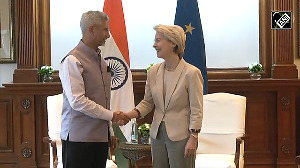 The first Marlon Brando film I ever watched was a groundbreaking blockbuster in its day. It was classic, cult-spawning written work adapted, with arguable loyalty, but resounding success, to the screen, and Marlon played a supporting role -- that of an aging patriarch -- in a movie about families, about America, but essentially about a son coming to grips with his father's death.
The first Marlon Brando film I ever watched was a groundbreaking blockbuster in its day. It was classic, cult-spawning written work adapted, with arguable loyalty, but resounding success, to the screen, and Marlon played a supporting role -- that of an aging patriarch -- in a movie about families, about America, but essentially about a son coming to grips with his father's death.
As an excitable kid, I remember raving about the son, idolising him. Today, whenever I see the film, I see nothing but Marlon Brando, trapped in the mire of awful cinema; the greatest actor that ever lived, playing a larger-than-life role that couldn't help being too small for him.
Much like Superman then, celluloid now stands orphaned. It is a poignant moment when we are suddenly forced to yelp out our unexpected goodbyes. We find that an eclectic selection of vivid memories showcasing his startling power and spirit overwhelms us far more than expected.
He was 80 years old, and, to be frank, the object of much ridicule. He was not working on cinema of note. And his recent shenanigans had left us with much to wince at. Sadistic critics waxed dry on how his whole body of work was proving less substantial than, well, his whole body. The barbs almost seemed invited. There was never any backlash. One-time indisputable genius continued to deride itself into our collective embarrassment.
![]()
More on Brando!
![]()
![]()
![]()
![]()
Kamal Haasan: I am the son of Brando![]()
Pankaj Kapur: Brando was one of the greatest actors![]()
Why, then, do we now feel bereft? Not just of his continued presence, but almost a righteous indignation, a feeling of being cheated?
Compared to, and unlike, the finest actors across cinematic generations such as Montgomery Clift, Lawrence Olivier, Cary Grant, Dustin Hoffman, Robert De Niro and Johnny Depp, he never tried to satiate our awed greed. He never gave us anywhere near as rich and textured a filmography as the above mentioned actors.
He acted in some painful films. There exist examples of him going through the motions for entire performances, without even pretending to act. He redefined idiosyncrasy. He threw tantrums and unashamedly worked in films simply for exorbitant pay cheques. And yet, he gave us so much to marvel at.
If at all there was ever someone 'born to act', it was Brando.
 Like all superhumans, inherently too large to inhabit a mortal universe, he viewed his destiny with disdain. Acting did not seem like an ambitious art. He felt each of us acted throughout our lives.
Like all superhumans, inherently too large to inhabit a mortal universe, he viewed his destiny with disdain. Acting did not seem like an ambitious art. He felt each of us acted throughout our lives.
His claim, that he did so for a living simply because he did not possess the moral courage to turn down the ridiculous pay cheques it brought with it, was shockingly full of characteristic candour.
He was accepted as an incandescently brilliant performer from the very beginning, and this just served to make him glaringly self-aware of his own insubstantiality. As he confessed to Truman Capote, in that most telling of reports (for The New Yorker in 1957), he felt just like a young boy, suddenly 'sitting on a huge pile of candy'.
He began, like most of his characters, by breaking the rules. Expelled from high school for riding a motorcycle down the hallway, Brando shattered the mould throughout his life.
In the 1950s, while Hollywood's leading men continued to dress nattily, he would don a novelty plastic arrow seemingly penetrating his head, wear what later became classically Kerouack-ian blue jeans and tee shirts, and cruise down Sunset in a convertible.
Primal sexuality oozed naturally from him. His sardonic, aggressive characters became far more likeable than their creators ever intended them to be. The strongest proponent of method acting, he made bizarre decisions, like squeezing his muscular, 5'10" frame into a convincing Napoleon.
His career is frustrating to a cinema lover, for his gift and craft is unerringly obvious. The professional masochism stares you in the face as you realise the depths to which he felt it necessary to sink. The strange decisions, the turning to the icebox for comfort, the Elvisian seemingly cathartic gluttony, all echoed his innate need to escape stardom. Yet, he could not.
Destiny is a compelling mistress. Even in films where he attempts to act badly by grimacing needlessly and overplaying gestures, we still glimpse flashes of inevitable greatness break through:
- The self-inspired, emotionally crippling improvised monologues in Last Tango In Paris.
- The terrifying, shaven-headed Sergeant Kurtz glaring right through our theatre-audience facades and reapprising us of our status as errand boys sent by grocery clerks to do their bidding in Apocalypse Now.
- The bitter, paraplegic war veteran in The Men impossible to perceive as a performance.
- Terry pulling on Edie's lace glove in On The Waterfront often considered the single greatest acting performance in the history of the medium.
- The fatally noble Mexican bandit in Viva Zapata.
- The underrated sadistic, anti-Western he directed, One Eyed Jacks.
- The unforgettable brutish Stanley Kowalski screaming the immortal 'Stella!' in A Streetcar Named Desire.
- And not least in terms of classic Brando memories: Don Vito Corleone reassuring Johnny Fontane that he would indeed get the part, if only by way of an irresistible offer, one he couldn't refuse.
 In an art littered with tremendous examples of the 'very special' and the 'very good', Brando remains the only one universally acclaimed as worthy of the epithet 'great'. Which is why he was never satisfied with himself or his craft. Like Zaphod Beeblebrox in the Douglas Adams books, his fame catapulted him into moments where he saw himself in humbling perspective with the rest of the universe. And, in this case, he became disarmingly aware of his own insignificance. Of course, he still considered himself superior to most of the rest of his fellow men, and this is why his story is one where he longed, he passionately hungered, for love, for someone to trust entirely.
In an art littered with tremendous examples of the 'very special' and the 'very good', Brando remains the only one universally acclaimed as worthy of the epithet 'great'. Which is why he was never satisfied with himself or his craft. Like Zaphod Beeblebrox in the Douglas Adams books, his fame catapulted him into moments where he saw himself in humbling perspective with the rest of the universe. And, in this case, he became disarmingly aware of his own insignificance. Of course, he still considered himself superior to most of the rest of his fellow men, and this is why his story is one where he longed, he passionately hungered, for love, for someone to trust entirely.
In a world with ever-shortening attention spans, even Marlon Brando will be forgotten: the demands, the bad roles, the ridiculous comments, kissing Larry King on the lips, the incessantly expanding waistline, the impulsive marriages, the Academy Award debacles, refusing to be on the same set at the same time as director Frank Oz, the redundant cross-dressing scenes on film, the anti-Semitic comments and then weeping in front of rabbis, the inexplicable remake of Mutiny On The Bounty. It will all be forgotten.
In The Wild One, there is a moment when his character is asked by a matron what it is that he is rebelling against. Brando in his black leather jacket and jeans looks at her scornfully, with patience. There is a sneer dying to come out. His nostrils quiver in disgust. His eyebrows utter volumes in the half-instant of silence following her question. And then he utters undying words, prophetically evoking parallels to his life as a whole: "What've you got?"
What will remain forever immortal is Marlon Brando, The Actor.
Thank you, Mr Brando.
Rest In Peace, Sir.






 © 2025
© 2025